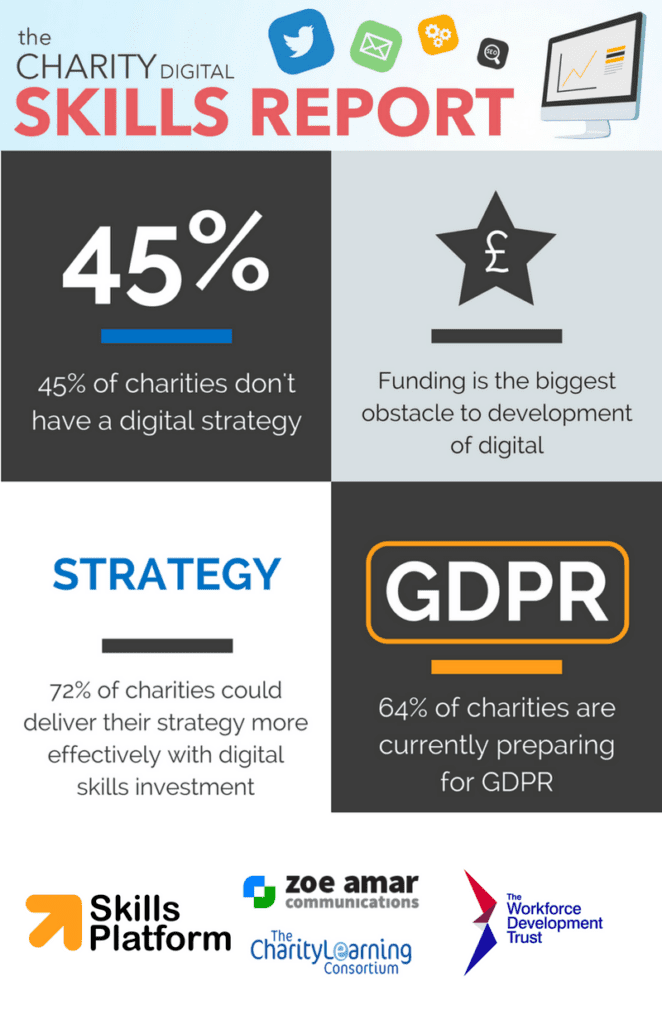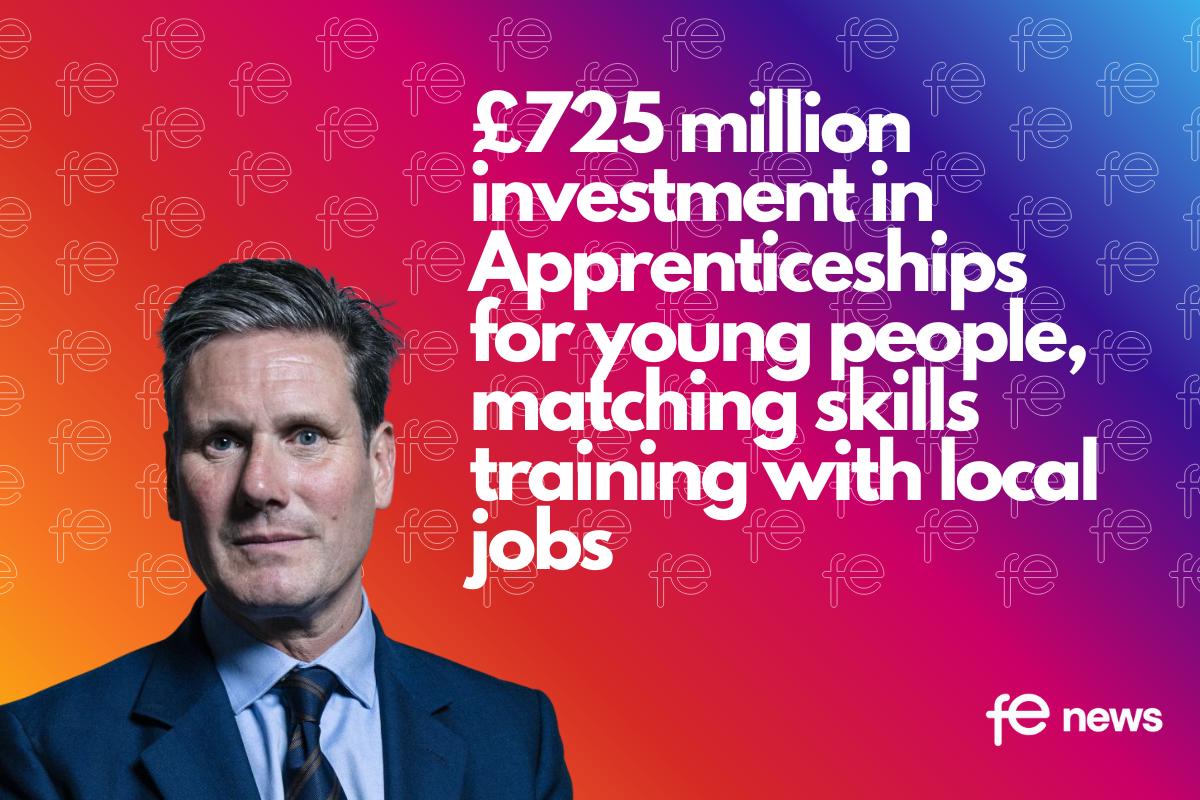Charity Digital Skills Report 2018 – Has Lack of Funding and GDPR Derailed Progress?

IS A LACK OF FUNDING AND GDPR DERAILING DIGITAL TRANSFORMATION?
The Skills Platform and Zoe Amar Communications have launched the Charity Digital Skills Report 2018; the annual barometer which measures the progress of digital within the UK charity sector. Top line results reveal incremental progress has been made; but is this slow pace of change fast enough?
Biggest barriers to digital transformation
This year’s report reveals lack of funding is the number one barrier to digital progress (58%) which is a significant increase from 52% in 2017. Skills is the second biggest challenge at 51% (down from 57 % last year when it took the top spot). There is a growing concern about culture, with 46% saying that it needs to change. Charities also still feel constrained by infrastructure and processes. And 1 in 3 state that a lack of trustee buy-in is holding their charity back in digital.
Emerging tech skills gap
Although digital skills have fallen into second place, it clearly remains a huge concern. In particular, 73% of charities say that they have low to very low skills in AI, up from 68% last year. Charities are particularly struggling to embrace emerging technology with only 14% planning for how emerging tech could affect their work. With the government recently commissioning a review into AI which estimated that it could add £630 billion to the UK economy by 2035, recommending that investment in skills was a priority, having such a low skill base in this area could be causing charities to miss out. Some good progress has been made, however, as more than half (53%) of respondents see their digital strategy skills as fair or low, a 10% improvement from 63% last year.
GDPR – are charities heading for a fall?
Almost two thirds of respondents (64%) saying they are currently preparing for GDPR and will have everything in place for when it comes into force. This finding is supported by the Department for Digital, Culture, Media and Sports’ research which show charities seem to have a higher awareness and put more preparation in place for GDPR compared to other sectors. However, has focusing on GDPR come at the expense of the progression of other projects such as digital transformation – both in terms of budget and prioritisation? Whilst charities say they are getting ready, worryingly, handling data is still noted a skills gap, with 62% rating themselves as fair to low with using, managing and analysing data and 47% rate themselves as fair to low with cybersecurity. Will this skills gap see charities head for a fall when it comes to GDPR?
The digital leadership challenge
There is a growing expectation that charity leaders must understand trends and how they affect their charities. 63% now want this, rising from 58% last year. Similarly, 53% want them to have some experience or understanding of digital tools, growing from 46% last year. The majority of charities (69%) cite their board’s digital skills as low or having room for improvement, an improvement of 2% on last year. 65% are worried that they will miss out on opportunities for digital fundraising (down 1% from last year). There has been a big increase in worries about the lack of the leadership support needed to develop more digital products and services, rising significantly to 51%, up from 42% last year. This show strong demand for boards and leadership teams to develop their digital skills.
Tracey Crouch, Minister for Sports and Civil Society, and Margot James, Minister for Digital and Creative Industries have written the foreword for this year’s Charity Digital Skills Report. An excerpt includes: “This government knows that digital is absolutely key to the growth of organisations and communities. It allows them to innovate and demonstrate Britain’s unique culture to the rest of the world. But that is only possible with a digitally skilled workforce. This report shows where we are, and helps us to understand what we need to do to improve digital throughout the charity sector. We are pleased to see that things are improving but there is still a long way to go if charities are to truly embrace the opportunities digital offers to help them scale up impact, save money and time, reach more people and increase their revenues.”
Zoe Amar, Founder and Director of Zoe Amar Communications, comments: “This year’s report uncovers a worrying lack of digital progress across the board. This includes everything from leadership, skills, culture, embracing emerging tech and a lack of funding is rising as a huge challenge. Although progress is slow, some improvements have been made including using digital more strategically and getting GDPR ready, but this slow pace of digital change could be putting charities at high risk of becoming unsustainable and irrelevant.
Dave Evans, Product Marketing Manager at the Skills Platform, comments: “Our report is an invaluable resource for charities to benchmark their progress against the sector; to track developments made since last year and to understand the overall digital trends and what the implications are. Whilst progress has undoubtedly been much slower than we had anticipated, it is undoubtedly a true reflection of the difficult climate charities have been operating in. It provides the platform charities need to reprioritise digital and ensure it returns to the top of the agenda.”
Sarah Atkinson, Director of Policy, Planning and Communications at The Charity Commission, adds: “Digital technology offers charities a unique opportunity to take the impact of their work directly to their supporters’ smartphones. Through the use of smart infographics, social media and targeted digital campaigns, charities can communicate clearly to donors where their hard earned pennies are going. If we want to drive up public trust and confidence in charity, we need to see charities harnessing these new opportunities and unlocking the true powers of digital.
“The slight improvement in digital skills that this research shows is encouraging, but clearly not the step change we would have wanted to see. Embracing new technology needs to go right across a charity’s culture. One sure fire way to get your charity thinking digital is to make sure you have a range of ideas and perspectives on your board. With technology evolving all the time, all charities can benefit from taking a step back and reviewing their approach to digital.”
Vicky Browning, Chief Executive at ACEVO, comments: “Through our work at ACEVO, I have seen that the most effective leaders are those who are quick to seize opportunities, manage risk and stay ahead of the trends affecting their charities. Digital is no exception to this. Embracing digital and leading transformation from the top can enable charity leaders to meet and exceed objectives across everything from the services you offer, to how you fundraise and the people you hire. The possibilities are really exciting. And it’s interesting to see that the demand for this isn’t just coming from donors and supporters. The report shows that increasingly staff expect leaders to have a good grounding in digital trends and tools. Ultimately, for CEOs to bring people with them they need to lead from the front in digital.”
Mandy Johnson, Chief Executive, Small Charities Coalition, adds: “These finding indicate that funders are behind the pace of change of the charities that they look to support. This is worrying; funders need to adapt quickly if the charity sector is going to thrive in the digital world that they operate in. In light of these results, I would advise charity leaders to make sure they are able to articulate the increased impact their organisations could have through the adoption of technology with the hope that this gives a better understanding to their stakeholders around them.”
Lara Burns, Chief Digital and Technology Officer, Age UK, concludes: “These are really tough times financially for charities and it is unsurprising if investment in developing digital capacity is often being de-prioritised as a result – especially by organisations struggling to keep going at all. While acknowledging how hard the funding choices facing charities are at the moment, it’s worth considering how smart investment in the right digital focus can pay off – not just financially but in many other ways too. So if your charity is in this position, a great starting place would be to review your digital strategy and how it could support your organisation’s funding growth or help create efficiencies. If you can make those investments, it will be worth it in the long term.”
The Charity Digital Skills Report 2018 is now available to read online and includes full industry commentary.











Responses